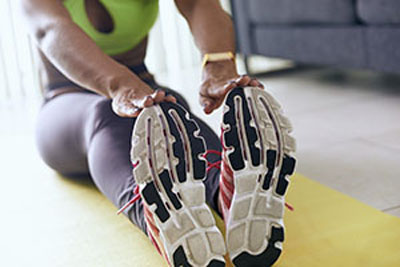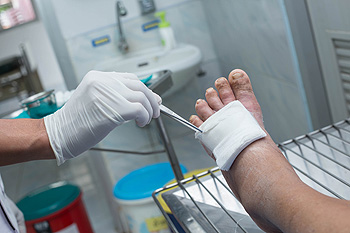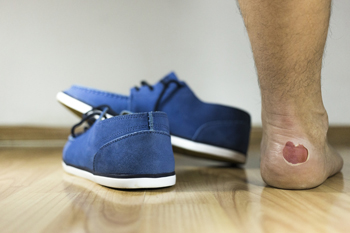Items filtered by date: January 2020
Gout Pain Can Be Managed
Stretching the Feet May Be Helpful in Building Strength
 When the feet are frequently stretched, painful foot and ankle injuries may be avoided. The tendons, ligaments and muscles of the feet may become stronger when a stretching regime is routinely performed. An effective stretch for the toes can consist of placing your feet flat on the floor while sitting down. As the heels are kept on the floor, raise the toes up and down until the ball of the foot lifts off the floor. This can be beneficial in building flexibility and mobility. Some patients find it helpful to walk barefoot on the sand, as this can help to add strength to the overall feet and calves. If you would like more information about how stretching can help the feet, it is suggested that you speak to a podiatrist.
When the feet are frequently stretched, painful foot and ankle injuries may be avoided. The tendons, ligaments and muscles of the feet may become stronger when a stretching regime is routinely performed. An effective stretch for the toes can consist of placing your feet flat on the floor while sitting down. As the heels are kept on the floor, raise the toes up and down until the ball of the foot lifts off the floor. This can be beneficial in building flexibility and mobility. Some patients find it helpful to walk barefoot on the sand, as this can help to add strength to the overall feet and calves. If you would like more information about how stretching can help the feet, it is suggested that you speak to a podiatrist.
Stretching the feet is a great way to prevent injuries. If you have any concerns with your feet consult with Dr. Joshua David Scoll from Pennsylvania. Our doctor will assess your condition and provide you with quality foot and ankle treatment.
Stretching the Feet
Being the backbone of the body, the feet carry your entire weight and can easily become overexerted, causing cramps and pain. As with any body part, stretching your feet can serve many benefits. From increasing flexibility to even providing some pain relief, be sure to give your feet a stretch from time to time. This is especially important for athletes or anyone performing aerobic exercises, but anyone experiencing foot pain or is on their feet constantly should also engage in this practice.
Great ways to stretch your feet:
- Crossing one leg over the others and carefully pull your toes back. Do 10-20 repetitions and repeat the process for each foot
- Face a wall with your arms out and hands flat against the wall. Step back with one foot and keep it flat on the floor while moving the other leg forward. Lean towards the wall until you feel a stretch. Hold for 30 seconds and perform 10 repetitions for each foot
- Be sure not to overextend or push your limbs too hard or you could risk pulling or straining your muscle
Individuals who tend to their feet by regular stretching every day should be able to minimize foot pain and prevent new problems from arising.
If you have any questions, please feel free to contact one of our offices located in Philadelphia, Bensalem, and Fairless Hills, PA . We offer the newest diagnostic and treatment technologies for all your foot care needs.
Diabetes and Daily Foot Checks
 Many diabetic patients are aware of the necessity of checking their feet on a daily basis. This can be helpful in noticing if there are cuts, scrapes, or bruises. It is important for wounds that are found on the feet to be promptly treated, as this may be beneficial in preventing infections. It can be common for diabetic patients to experience the condition known as neuropathy. This is a condition that makes it difficult to feel if there are existing cuts and can lead to painful foot ulcers. Proper foot care typically consists of wearing shoes that fit correctly, trimming the toenails properly, and not walking barefoot. If you have diabetes, it is strongly advised that you are under the care of a podiatrist who can help you to manage your condition.
Many diabetic patients are aware of the necessity of checking their feet on a daily basis. This can be helpful in noticing if there are cuts, scrapes, or bruises. It is important for wounds that are found on the feet to be promptly treated, as this may be beneficial in preventing infections. It can be common for diabetic patients to experience the condition known as neuropathy. This is a condition that makes it difficult to feel if there are existing cuts and can lead to painful foot ulcers. Proper foot care typically consists of wearing shoes that fit correctly, trimming the toenails properly, and not walking barefoot. If you have diabetes, it is strongly advised that you are under the care of a podiatrist who can help you to manage your condition.
Diabetic foot care is important in preventing foot ailments such as ulcers. If you are suffering from diabetes or have any other concerns about your feet, contact Dr. Joshua David Scoll from Pennsylvania. Our doctor can provide the care you need to keep you pain-free and on your feet.
Diabetic Foot Care
Diabetes affects millions of people every year. The condition can damage blood vessels in many parts of the body, especially the feet. Because of this, taking care of your feet is essential if you have diabetes, and having a podiatrist help monitor your foot health is highly recommended.
The Importance of Caring for Your Feet
- Routinely inspect your feet for bruises or sores.
- Wear socks that fit your feet comfortably.
- Wear comfortable shoes that provide adequate support.
Patients with diabetes should have their doctor monitor their blood levels, as blood sugar levels play such a huge role in diabetic care. Monitoring these levels on a regular basis is highly advised.
It is always best to inform your healthcare professional of any concerns you may have regarding your feet, especially for diabetic patients. Early treatment and routine foot examinations are keys to maintaining proper health, especially because severe complications can arise if proper treatment is not applied.
If you have any questions please feel free to contact one of our offices located in Philadelphia, Bensalem, and Fairless Hills, PA . We offer the newest diagnostic and treatment technologies for all your foot and ankle needs.
Marathon Runners May Endure Blisters on the Feet
People who enjoy running marathons are most likely familiar with having blisters on the feet. These generally form as a response to excessive friction that can come from the foot rubbing against the socks and sneakers. They typically develop on the sides of the feet or between the toes. It is the body’s natural reaction to form a protective bubble over the damaged skin. This is filled with fluid, and will gradually drain on its own when the skin has healed. There are methods that can help to minimize blisters. These can include wearing shoes that fit correctly, and it may be beneficial to develop calluses by engaging in a good training schedule. Blisters may be protected while running by covering them with specific types of tape. If you have developed blisters on your feet, and enjoy the sport of running, it is suggested that you consult with a podiatrist who can offer possible treatment techniques.
Blisters may appear as a single bubble or in a cluster. They can cause a lot of pain and may be filled with pus, blood, or watery serum. If your feet are hurting, contact Dr. Joshua David Scoll of Pennsylvania. Our doctor can provide the care you need to keep you pain-free and on your feet.
Foot Blisters
Foot blisters are often the result of friction. This happens due to the constant rubbing from shoes, which can lead to pain.
What Are Foot Blisters?
A foot blister is a small fluid-filled pocket that forms on the upper-most layer of the skin. Blisters are filled with clear fluid and can lead to blood drainage or pus if the area becomes infected.
Symptoms
(Blister symptoms may vary depending on what is causing them)
- Bubble of skin filled with fluid
- Redness
- Moderate to severe pain
- Itching
Prevention & Treatment
In order to prevent blisters, you should be sure to wear comfortable shoes with socks that cushion your feet and absorb sweat. Breaking a blister open may increase your chances of developing an infection. However, if your blister breaks, you should wash the area with soap and water immediately and then apply a bandage to the affected area. If your blisters cause severe pain it is important that you call your podiatrist right away.
If you have any questions, please feel free to contact one of our offices located in Philadelphia, Bensalem, and Fairless Hills, PA . We offer the newest diagnostic and treatment technologies for all your foot care needs.
Treating Ingrown Toenails
 Ingrown toenails can be both uncomfortable and painful if left untreated. One of the most common causes of their development is hereditary or genetic factors. The curvature of your toenails are passed down to you, so if you have family members that are prone to getting ingrown toenails, it is likely you may run the same risk. Cutting your toenails too short is another cause of getting an ingrown toenail. If they are cut too short, the skin around the toe will adapt, forming an ingrown toenail. It is also advised you do not cut your toenails on an angle, rather trim them straight across. If you are experiencing pain, a podiatrist may suggest a splint to help stop the nail from growing any further into your skin. In more severe cases, a podiatrist may suggest surgery and full removal of the toenail. To help ease the pain, it’s recommended that you soak your feet in epsom salt, as this will also help to get rid of any bacteria under the toenails. For professional care we recommend you consult with a podiatrist who can advise you on the best course of treatment for your case.
Ingrown toenails can be both uncomfortable and painful if left untreated. One of the most common causes of their development is hereditary or genetic factors. The curvature of your toenails are passed down to you, so if you have family members that are prone to getting ingrown toenails, it is likely you may run the same risk. Cutting your toenails too short is another cause of getting an ingrown toenail. If they are cut too short, the skin around the toe will adapt, forming an ingrown toenail. It is also advised you do not cut your toenails on an angle, rather trim them straight across. If you are experiencing pain, a podiatrist may suggest a splint to help stop the nail from growing any further into your skin. In more severe cases, a podiatrist may suggest surgery and full removal of the toenail. To help ease the pain, it’s recommended that you soak your feet in epsom salt, as this will also help to get rid of any bacteria under the toenails. For professional care we recommend you consult with a podiatrist who can advise you on the best course of treatment for your case.
Ingrown toenails may initially present themselves as a minor discomfort, but they may progress into an infection in the skin without proper treatment. For more information about ingrown toenails, contact Dr. Joshua David Scoll of Pennsylvania. Our doctor can provide the care you need to keep you pain-free and on your feet.
Ingrown Toenails
Ingrown toenails are caused when the corner or side of a toenail grows into the soft flesh surrounding it. They often result in redness, swelling, pain, and in some cases, infection. This condition typically affects the big toe and may recur if it is not treated properly.
Causes
- Improper toenail trimming
- Genetics
- Improper shoe fitting
- Injury from pedicures or nail picking
- Abnormal gait
- Poor hygiene
You are more likely to develop an ingrown toenail if you are obese, have diabetes, arthritis, or have any fungal infection in your nails. Additionally, people who have foot or toe deformities are at a higher risk of developing an ingrown toenail.
Symptoms
Some symptoms of ingrown toenails are redness, swelling, and pain. In rare cases, there may be a yellowish drainage coming from the nail.
Treatment
Ignoring an ingrown toenail can have serious complications. Infections of the nail border can progress to a deeper soft-tissue infection, which can then turn into a bone infection. You should always speak with your podiatrist if you suspect you have an ingrown toenail, especially if you have diabetes or poor circulation.
If you have any questions, please feel free to contact one of our offices located in Philadelphia, Bensalem, and Fairless Hills, PA . We offer the newest diagnostic and treatment technologies for all your foot care needs.


